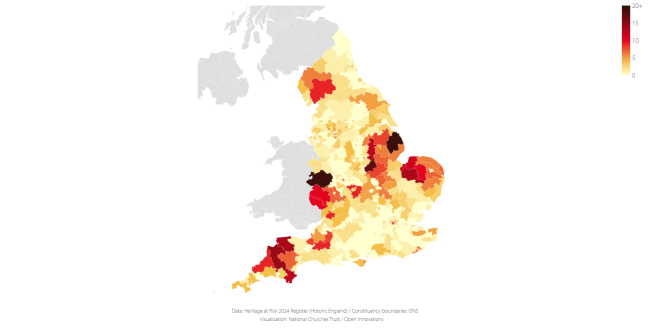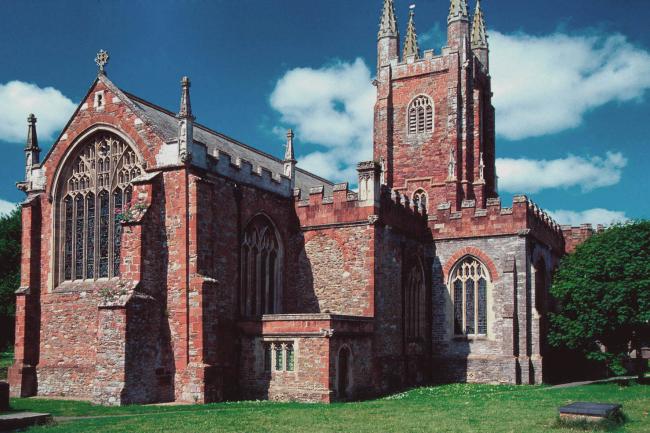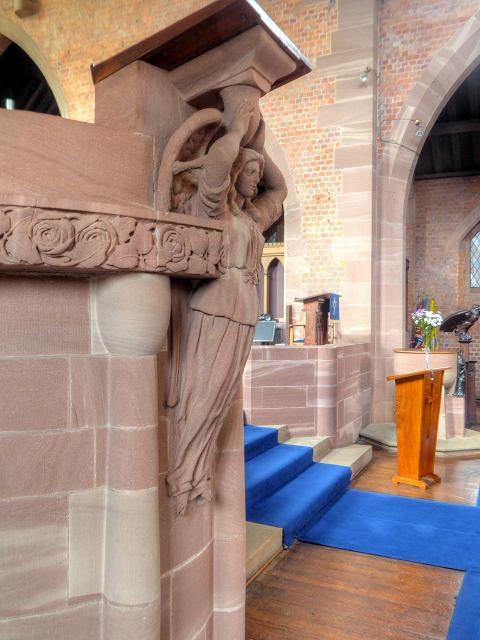New data reveals England’s church heritage ‘danger zones’ and shows the number of churches at risk in MP’s constituencies. Find out how many churches, chapels, cathedrals and meeting houses are at risk in your constituency and what you can do to save them.
A new map, from the National Churches Trust, shows that Lincolnshire, Shropshire, Herefordshire, Devon, Cornwall, inner and central London, parts of Manchester and the East Midlands contain the largest numbers of historic churches on Historic England’s Heritage at Risk Register.
Historic England’s Heritage at Risk Register includes churches that are listed as being of historic or architectural significance. Many of the churches are hundreds of years old and are some of England’s most important architecture containing beautiful stained glass, monuments and woodwork. All of which could be lost forever if the church falls into disrepair.
Show me the heritage that is a risk
More than 60 per cent of all the MPs in England – 336 MPs – have a church, chapel, meeting house or cathedral on the Historic England Heritage at Risk Register in their constituency. They include the leaders of the main political parties including Sir Keir Starmer, Kemi Badenoch and Ed Davey.

The top ten constituencies and MPs are:
- South Shropshire, Stuart Anderson, Conservative, 19
- Louth and Horncastle, Victoria Atkins, Conservative, 19
- Melton and Syston, Edward Argar, Conservative, 17
- Torridge and Tavistock, Geoffrey Cox, Conservative, 14
- South West Norfolk, Terry Jermy, Labour, 13
- North Devon, Ian Roome, Liberal Democrat, 13
- South Devon, Caroline Voaden, Liberal Democrat, 12
- Newark, Robert Jenrick, Conservative, 12
- North West, Norfolk, James Wild, Conservative, 11
- North Herefordshire, Ellie Chowns, Green 10
The leaders of the main political parties representing English constituencies all have historic churches at risk in their constituencies:
- Kemi Badenoch, North West Essex, Conservative, 3
- Ed Davey, Kingson and Surbiton, Liberal Democrat, 1
- Keir Starmer, Holborn and St Pancras, Labour, 10
55 places of worship added to the Heritage at Risk Register in 2024
There are 969 places of worship on Historic England’s 2024 Heritage at Risk Register. 23 were removed but 55 added, an increase of 26 over the total on the 2023 Register.
959 of the 969 places of worship are cathedrals, parish churches, chapels and meeting houses, with the Register also including a small number of buildings belonging to other faiths.
With an estimated 3,500 churches having closed in the last ten years, and an increasing number under financial strain due to falling numbers of worshippers, the increase in the number of churches on the Heritage at Risk Register sends an urgent warning to all those who care about England’s historic churches.

We must save our heritage before it’s too late
“England has some of the most historic and beautiful churches to be found anywhere in the world. But this priceless heritage is in danger as never before,” shares Sir Philip Rutnam, Chair of the National Churches Trust.
“55 cathedrals, churches, chapels and meeting houses were added to the Historic England’s Heritage at Risk Register this year. Our fear is that many of the new churches and also those already on the Register will be simply left to rot and decay as there is a desperate shortage of money to look after this heritage.
“The crisis affecting church heritage could even get worse in the coming months if the Government refuses to renew the Listed Places of Worship Grants Scheme, a financial lifeline which allows historic churches to claim back the VAT on the cost of repairs.
“We understand that a decision about the future of the scheme will be made by The Department for Culture, Media and Sport (DCMS) in the next few months. The spending settlement that the DCMS received from the Chancellor in the Budget is less generous than some other Government departments and tough spending decisions have lie ahead.
“If the VAT scheme, which has been in place in its current form since 2004, is not renewed, the costs of repairing a historic church to enable it to stay open would increase by a fifth.
“We fear that if the scheme were not renewed, more historic churches will close. There is already a major financial crisis affecting church buildings: the Church of England alone has a backlog of repairs to parish churches estimated at over £1 billion with the annual repair bill estimated at £150 million. I urge the Government not to make the situation even worse.”

How the National Churches Trust is helping churches at risk
Thanks to the support of the National Churches Trust and other funders, seven churches have been removed from the Heritage at Risk Register in 2024 and are no longer in danger.
The churches our grants have helped to remove from the list are:
- Parish Church of St Thomas, Dudley, West Midlands
- Church of St George, Kidderminster, Worcestershire
- St Pancras Old Church, Camden, London
- Church of St Stephen, Etton, Cambridgeshire
- Church of All Saints and St Andrew, Kingston, Cambridgeshire
- Church of St Mary, Buckland, Oxfordshire
- Christ Church, Mount Pellon, West Yorkshire
“We hope to save more in future years, but we are seeing more and more churches in financial distress,” explains Claire Walker, Chief Executive of the National Churches Trust.
“Demand for our grants is now so high that in 2024 we could only fund one in four grant applications that we received.
“Everybody can see for themselves the beauty of historic churches. Less well known is the fact that churches contribute £55 billion a year to the UK in social good. They also provide preventative health and social support that would cost the NHS an additional £8.4 billion a year to fund – a figure equal to employing 230,000 nurses.”
“The first step the UK Government should take in addressing this urgent issue is to renew – and make permanent – the Listed Places of Worship Grants Scheme to ensure historic churches can reclaim the 20 per cent VAT on their repair bills.”
“What is needed is a national plan to repair and save more of England’s churches, bringing together the Government, Christian denominations and heritage bodies so that money can be effectively targeted at churches at risk.”

How you can support churches at risk – please contact your MP
Why not use our heritage at risk map to share with your MP the heritage that is at risk in your constituency – and to highlight why it needs saving?
On the map you will find:
- Details of your constituency, the name of your MP and a link to their parliament website page where you can find out how to contact them
- The number of places of worship at risk in your constituency
- Details about the places of worship at risk, including photos, listing status and important heritage in the building.
Sharing this with your MP can help make the case for church buildings – why they are important and why they need saving. Please do share any responses you get to Hello@nationalchurchestrust.org as this helps us with our advocacy efforts.
Thank you for your support in helping keep churches open and in use.

